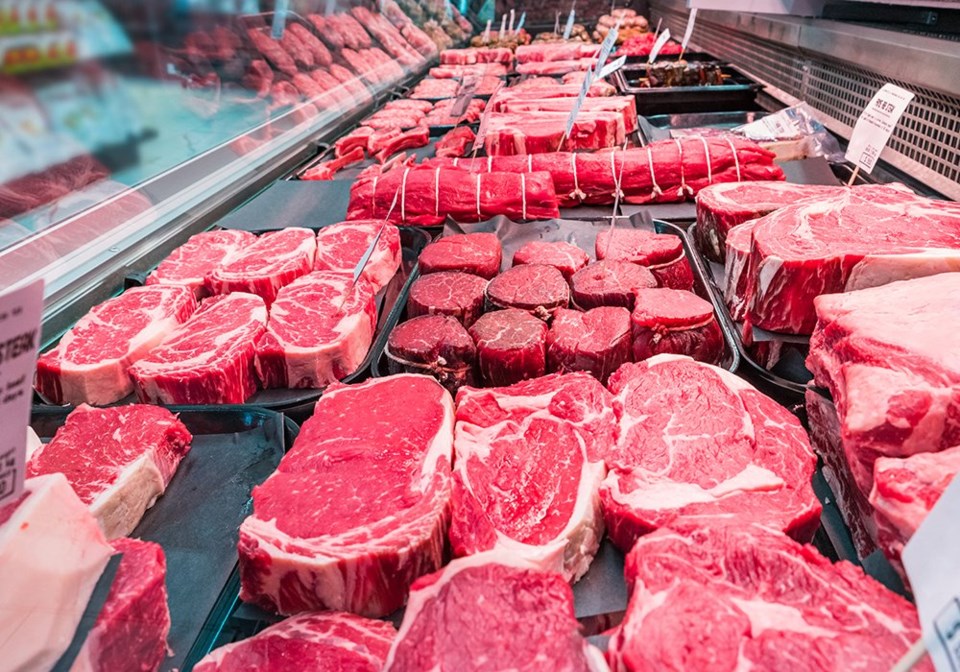Soaring beef prices endured by consumers don’t reflect what farmers and ranchers actually earn for their cattle, leading an industry leader to fear for the future.
Although costs ranging from feed to fuel “are going through the roof,” producers aren’t seeing any increases in cattle prices, said Melanie Wowk, chair of Alberta Beef Producers.
“There’s two large packers in southern Alberta that are responsible for 80 percent of the slaughter of Canada’s beef market. And so the question is exactly why is there such a discrepancy between what we’re getting, and what the packers and retailers are making?”
The financial strain on cow-calf and feedlot producers led Wowk to fear that “what’s going to end up happening is this is just going to put more and more people out of business and shrink our cattle herd even more in Canada.”
The sector was hard hit by heat waves and drought that affected much of Western Canada this summer, causing shortages of feed that forced many producers to downsize their herds.
Wowk estimated beef prices in grocery stores have more than doubled since the start of the COVID-19 pandemic. She sought to reassure consumers that producers are not behind the increases.
“We’re looking at ground beef in northeastern Alberta. I noticed that the Co-op was $9 per pound, whereas I think about a year-and-a-half ago, it was anywhere from $3 to $5 … I’m starting to wonder how the average Canadian family can afford to buy beef.”
However, Cargill said in a statement Nov. 22 that current prices in the beef market are ultimately the result of supply and demand.
“In part due to a shortage of labour, the industry is not currently able to process as many cattle as ranchers are able to produce. This, when combined with other backups of cattle due to COVID/weather events, plus an increase in demand for beef, accounts for the disconnect between live cattle prices and wholesale beef prices.”
Wowk said it is difficult to say what the federal or provincial governments can do to help beef producers doing business in a free market economy.
“And we don’t want to go to the supply management route … but there is such dominance at the top with two major companies (Cargill and JBS) that we’re just feeling the crunch right now.”
During a tour Nov. 18 of Olds College in Alberta, provincial Agriculture Minister Nate Horner said the provincial government “is well aware of the situation” and is working closely with ABP.
“We have a very strong demand, as everyone’s seen the price in the grocery store. And we have feeder (cattle) margins that have largely been underwater for the last three years, and a lot of producers are feeling the pinch.”
Although he said leverage is expected to shift to feeder cattle producers in 2022, the current situation “is what happens when you have a bottleneck (in the) consolidated processing sector, so we’re aware of the same things happening in the United States, and we’ll continue to monitor it and see where it goes.”
Besides collaborating with the provincial government on competitiveness research, “ABP is also working on a thorough supply chain review,” said the organization in a statement.
“From barriers facing local processing facilities to large-scale processors, the issues facing each level of processing are diverse and have impacts that are felt right down to producers. The industry needs to come together to find a solution to create equity and profitability throughout the entire supply chain.”
Horner said beef producers could be further affected by a potential strike at Cargill’s plant in High River, Alta.
United Food and Commercial Workers Canada (UFCW) Union Local 401, which represents more than 2,000 workers at the plant, served notice Nov. 10 that unionized workers will go on strike Dec. 6 if a contract deal is not reached with Cargill.
Two people died and hundreds of people fell ill due to a COVID-19 outbreak at the plant last year that was the largest in North America, forcing it to close for two weeks. Employees seek things such as better pay and working conditions as they continue to grapple with the ongoing pandemic.
“I look at it like we’re Team Alberta — from the producer, to the processor, to our employees, our processing facilities, and then the consumer — so we’ll continue to monitor, but we’re hopeful they find an amicable, timely solution,” Horner said.




